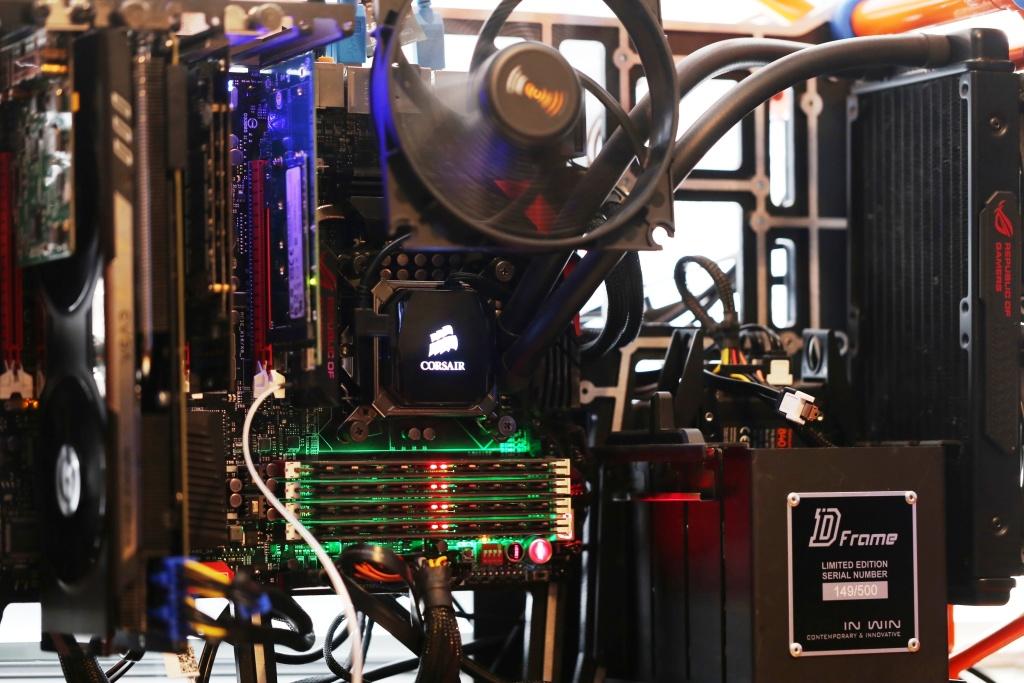TSSDR PCIE TEST BENCH AND PROTOCOL
SSD Testing at TSSDR differs slightly depending on whether we are looking at consumer or enterprise SSDs. For consumer SSDs, our goal is to test in a system that has been optimized with our SSD Optimization Guide, although CPU C States have not been changed at all. Benchmarks for consumer testing are also benchmarks with a fresh drive so, not only can we verify that manufacturer specifications are in line but also, so the consumer can replicate our tests to confirm that they have an SSD that is top-notch. We even provide links to most of the benchmarks used in the report.
Enterprise testing is significantly different as we explore performance in steady state, explore drive latency, and do our best to follow SNIA test protocol. For the Mach Xtreme MX Express PCIe SSD, this SSD is marketed as a consumer device so we are going to follow our typical consumer SSD testing protocol.
SYSTEM COMPONENTS
This new PCIe Test Bench build was the result of some great relationships and purchase; our appreciation goes to be quiet, Corsair, Crucial, Intel and InWin for their support in our project. Our choice of components is very narrow, in that, we choose only what we believe to be among the best available and links are provided to each that will assist in hardware pricing and availability, should the reader be interested in purchase.
| PC CHASSIS: | InWin D-Frame Open Air Chassis |
| MOTHERBOARD: | ASUS Maximus VI Z87 MotherBoard |
| CPU: |
Intel Core i7-4770K CPU |
| CPU COOLER: | Corsair H100i CPU Cooler |
| POWER SUPPLY: | be quiet Dark Power Pro 10 1000W PSU |
| SYSTEM COOLING: | be quiet Silent Wings 2 PC Fans |
| GRAPHICS CARD: |
EVGA GTX 770 Superclocked with ACX Cooler |
| MEMORY: | Crucial Ballistix Tactical Tracer 1600Mhz Memory |
| KEYBOARD: | Corsair Vengeance K95 Mechanical Gaming Keyboard |
| MOUSE: | Corsair Vengeance M95 MMO/RTS Laser Mouse |
| ROUTER: | NetGear R6300 AC1750 Dual Band Gigabit WiFi Router |
| HBA | HighPoint RocketU 1144C 4 x USB 3.0 20Gb/s HBA |
.
BENCHMARK SOFTWARE
The software we will be using for today’s analysis is typical of many of our reviews and consists of ATTO Disk Benchmark, QuickBench, Crystal Disk Info, Crystal DiskMark, AS SSD, Anvil Storage Utilities,and PCMark Vantage. In consumer reports, we prefer to test with easily accessible software that the consumer can obtain, and in many cases, we even provide links. Our selection of software allows each to build on the last and, also, to provide validation to results already obtained.
SANDFORCE SF-2281 FLASH STORAGE PROCESSOR
The SandForce SF-2281 flash storage processor is an eight channel 6Gbps flash storage processor (FSP) that has established itself as one of the best in the industry. In its configuration with the MX Express PCIe SSD, two SF-2281 FSPs are combined in a RAID 0 configuration, each controlling eight modules of Intel 32GB NAND flash memory.
 Along with the LSI SandForce name comes the fact that the MX Express has such technologies as DuraWrite, DuraClasss and RAISE built-in to provide for product durability, performance and consistent performance throughout the lifespan of the SSD.
Along with the LSI SandForce name comes the fact that the MX Express has such technologies as DuraWrite, DuraClasss and RAISE built-in to provide for product durability, performance and consistent performance throughout the lifespan of the SSD.
Crystal Disk Info provides some excellent information about the SSD itself to include its health, product information, ‘power on’ information as well as the characteristics of the SSD. We can see that the SSD is capable of TRIM as it is not grayed out as with APM, AAM and SMART.
We get used to there being very little identifying SMART values with similar RAID configurations, however, the MX-Express was totally void of SMART attributes all together, as well as Power on and Host Writes.
ATTO Disk Benchmark is perhaps one of the oldest benchmarks going and is definitely the main staple for manufacturer performance specifications. ATTO uses RAW or compressible data and, for our benchmarks, we use a set length of 256mb and test both the read and write performance of various transfer sizes ranging from 0.5 to 8192kb. Manufacturers prefer this method of testing as it deals with raw (compressible) data rather than random (includes incompressible data) which, although more realistic, results in lower performance results.
Listed specifications are 850MB/s read and 800MB/s write disk transfer and ATTO brought us within reach of that with highs of just over 760MB/s. Keeping in mind that ATTO uses only compressible data in its test data, we will definitely need to look closely at the remainder of our tests as, typically, ATTO will meet or exceed manufacturers specs.
 The SSD Review The Worlds Dedicated SSD Education and Review Resource |
The SSD Review The Worlds Dedicated SSD Education and Review Resource | 

Can’t wait til someone finally uses a pair of Marvell controllers raided with an LSI raid controller and 1GB of DDR3 ram. I like the idea of a PCIe with, let’s say, 2 Sandisk Extreme II 120’s raided with a good controller and a gig of fast ram. And to be honest, I don’t really care if it’s driverless PNP or not. Since I (and most others imo) don’t do much rebooting and don’t mind a longer boot time in exchange for blazing permormance.